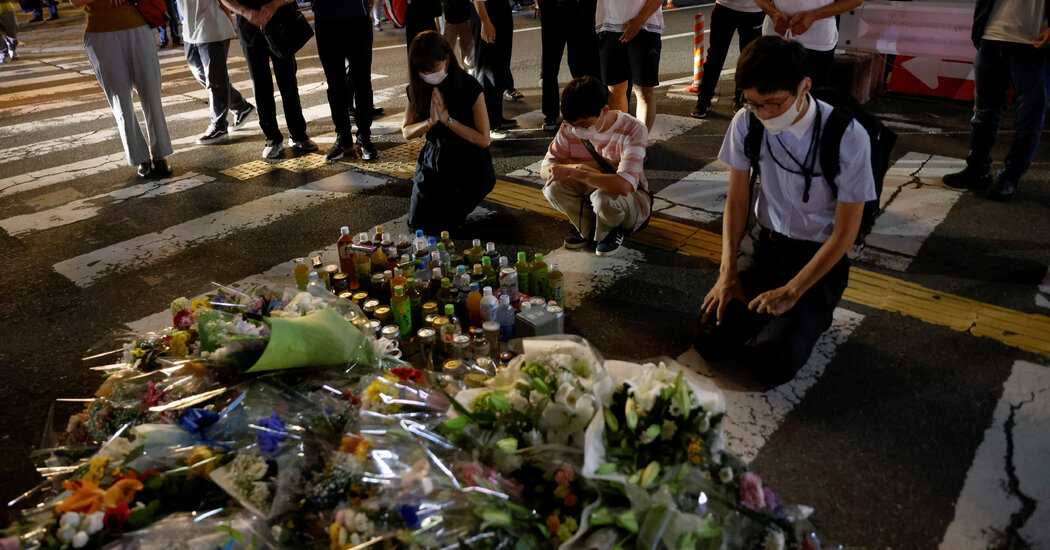The assassination of former Prime Minister Shinzo Abe at a campaign rally in western Japan was especially difficult to fathom because it involved a firearm — a type of crime that is extremely rare in a country with some of the strictest laws on buying and possessing drugs. firearms.
Gun violence is almost unheard of in Japan. There was only one firearms-related death in all of 2021. There have been 14 firearms-related deaths since 2017, a remarkably low figure for a country of 125 million people.
Erika Inoue, a 25-year-old Tokyo-based designer, reacted widely, saying the gun violence was hard to handle.
“The shooting part is confusing,” she said. “There are guns? in Japan?”
The Japanese firearms law states that, in principle, guns are not allowed in the country. There are exceptions for weapons used in hunting, but obtaining a permit is time consuming and expensive, so few people go through the hassle.
A person must pass 12 steps before purchasing a firearm, starting with a gun safety class and then passing a written exam three times a year. A doctor must approve the weapons buyer’s physical and mental health. Other steps include a comprehensive background check and a police inspection of the gun safe and ammunition safe needed to store firearms and bullets.
The shooting was all the more shocking because before Friday, even the idea of a political assassination seemed like a relic of a bygone era.
Tempers rarely run high in Japan’s famously sedate politics. Parliamentary debates usually go no further than mischief and false outrage, and even the far-right groups that regularly meander the streets in black vans spewing political propaganda are seen as a nuisance rather than a threat to public safety.
Police protection at political events is light, and during campaign season, voters have plenty of opportunities to interact with the country’s top leaders. Videos show Friday’s suspected gunman walking free near the former prime minister, firing a handmade pistol.
Local Japanese police said the handcrafted pistol used in the shooting was more than a foot long and eight inches high. They also said they seized several handmade weapons during a search of the suspect’s home.
Unlike the United States, where gun rights are a constant topic of discussion, firearms are rarely discussed in Japanese political circles. Mass murders – on the rare occasions when they do occur – usually do not involve weapons. Instead, perpetrators resort to arson or stabbing.
In recent weeks, Japanese media outlets have watched the wave of mass shootings in the United States with a mixture of disbelief and confusion. After the shooting at a school in Uvalde, Texas, The Asahi Shimbun, Japan’s second-largest circulation newspaper, published an editorial calling the United States “a weapons company” and saying that another tragedy had changed a classroom. in a “weapon massacre zone”.
Toyo Keizai, a prominent weekly business magazine and website, published an article last year after the January 6 attack on the Capitol asking, “Why is ‘gun ownership’ a non-negotiable right in the US?”
“It is difficult for Japanese to understand why gun ownership persists in the US, even with such a high number of casualties,” journalist Keiko Tsuyama said in the article.
Most Japanese people hardly ever come across guns in everyday life, even though police officers carry firearms. And until Mr. Abe’s shooting, Japan had almost no experience of the emotional and political aftermath of gun violence — something that has become a well-known ritual in the United States.
In 2021, there were 10 shootings in Japan that contributed to death, injury or material damage, according to the KLPD. Of those gun-related episodes, one person was killed and four others were injured. The figures do not include accidents or suicides.
Most of the approximately 192,000 licensed firearms in the country are shotguns and shotguns. By comparison, in the United States, where most firearms are unregistered, the number of weapons in civilian hands is, by some estimates, close to 400 million.
Political assassinations were a regular part of Japan’s turbulent politics in the years leading up to World War II. But since then, only a handful of politicians have been killed – and most without the use of weapons.
The last murder of a political figure at the national level was in 1960, when a 17-year-old extreme nationalist stabbed to death Japanese Socialist Party leader Inejiro Asanuma.
That same year, another ultra-nationalist attacked Abe’s grandfather, Prime Minister Nobusuke Kishi, stabbed him repeatedly in the leg and sent him to the hospital.
The little political violence Japan has seen in recent decades has often been linked to organized crime or right-wing groups. In 2007, Kazunaga Ito, the mayor of Nagasaki, was shot dead by a mobster.
Journalists have also been targeted at times. In 1987, a reporter for the left-wing Asahi Shimbun was killed in an incident linked to right-wing anti-Korean groups.
Protesters have sometimes voiced their grievances by committing suicide, hoping to arouse public sympathy for their cause. Most famously, novelist Yukio Mishima committed suicide by slitting his stomach in 1970 after leading a small group of right-wing militants in a failed coup d’état.
Gerald L. Curtis, professor emeritus of political science and expert in Japanese politics at Columbia University, said the deadly attack on Mr. Abe would reverberate in Japanese politics.
“It will undoubtedly shake the Japanese tremendously and reinforce the view that Japan is no longer the safe, peaceful country it has been since the end of World War II and that it must change to face the new terrifying reality it is facing.” face,” he said in an email.
“The question is how the Japanese political leaders will react.”

